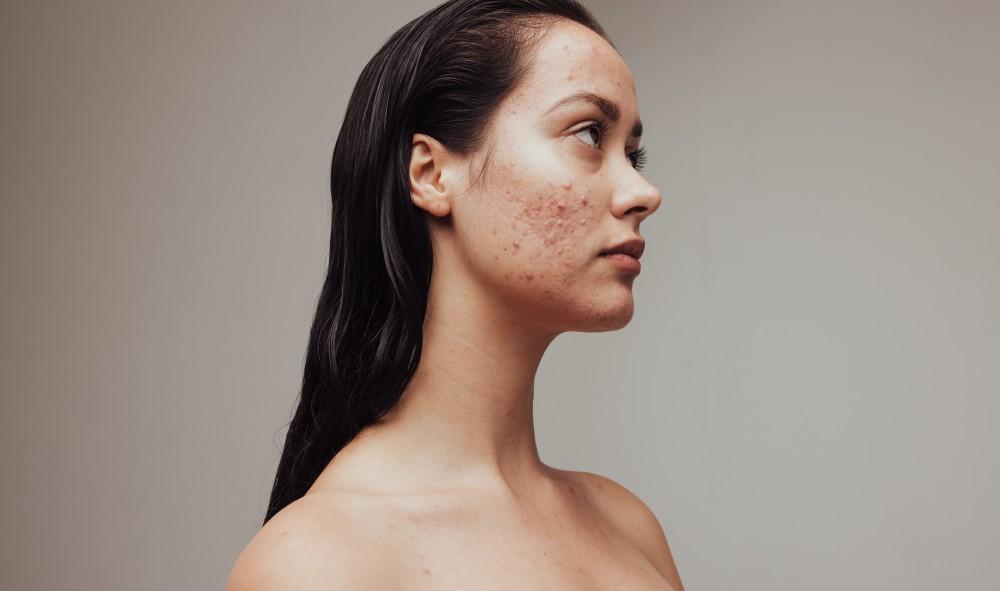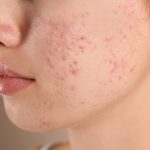Thyroid issues and acne can be interconnected, as imbalances in thyroid hormones can have varying effects on the skin and contribute to the thyroid acne or onset or exacerbation of acne. The thyroid gland, situated in the neck, plays a crucial role in regulating numerous bodily functions, including metabolism, temperature control, and hormonal balance. When the thyroid is overactive (hyperthyroidism) or underactive (hypothyroidism), it can disrupt these systems and manifest in various symptoms, including skin changes.
Understanding the Thyroid Gland
The thyroid gland produces hormones such as thyroxine (T4) and triiodothyronine (T3), which are vital for the body’s metabolism. These hormones influence how cells utilize energy, synthesize proteins, and regulate the sensitivity of tissues to other hormones like insulin. A malfunctioning thyroid can lead to a plethora of symptoms, and skin health is often affected due to the organ’s regulatory role in metabolism and hormone balance.
Thyroid and Acne Connection
Acne primarily arises from hormonal fluctuations, particularly androgens, which can stimulate the production of sebum (skin oil) that contributes to the clogging of hair follicles. Elevated levels of thyroid hormones, particularly in hyperthyroidism, may lead to an increase in sebum production. This increased oiliness can create an environment conducive to acne development, resulting in more severe or persistent cases of acne.
Conversely, hypothyroidism is associated with dry skin and changes in the hair and nails, which can impact the skin’s overall health, potentially leading to the development of acne. When the skin is not adequately moisturized, it may react by producing excess oil to compensate, which could also exacerbate acne.
Symptoms and Signs
Individuals suffering from thyroid issues may experience various symptoms beyond skin changes. With hyperthyroidism, common signs include rapid weight loss, hyperactivity, and sensitivity to heat. The skin may appear warm and moist, and acne may be redder or inflamed.
On the other hand, those with hypothyroidism may notice fatigue, weight gain, and increased sensitivity to cold. Their skin may appear dull and dry, but they could still experience acne due to clogged pores from excessive oil production as a compensatory mechanism.
Diagnosis and Evaluation
If one suspects that thyroid dysfunction is contributing to their acne, it is critical to consult with a healthcare professional for proper evaluation. A thorough medical history, physical examination, and blood tests to measure levels of thyroid hormones (T3, T4, and TSH – thyroid-stimulating hormone) can help determine thyroid function.
Treatment Options
The treatment of thyroid issues often involves medication to regulate hormone levels. In cases of hyperthyroidism, anti-thyroid medications, radioactive iodine, or surgery may be recommended. For hypothyroidism, hormone replacement therapy with synthetic thyroid hormones is the standard treatment.
For acne management, dermatological treatments may be employed depending on the severity of the acne. These can range from topical treatments like benzoyl peroxide or retinoids to systemic medications such as oral antibiotics, hormonal therapies, or isotretinoin. It is critical to address both the underlying thyroid condition and the acne itself for optimal skin health.
The Importance of Holistic Management
Managing thyroid issues alongside acne requires a holistic approach. Lifestyle changes—such as adopting a balanced diet, managing stress, and ensuring adequate hydration—can improve overall skin health and hormonal balance. Some studies suggest that maintaining a diet rich in omega-3 fatty acids, antioxidants, and low-glycemic index foods can help reduce inflammation and control acne.
Moreover, mindfulness practices like yoga and meditation may reduce stress levels, which can play a significant role in the hormonal fluctuations associated with both thyroid dysfunction and acne.
Conclusion
The link between thyroid issues and acne highlights the intricate relationship between our endocrine system and skin health. Early diagnosis and appropriate management of thyroid conditions are essential to mitigate their impact on skin manifestations such as acne. Emphasizing a comprehensive treatment model that addresses both hormonal imbalances and skin health can lead to improved outcomes for individuals affected by these interrelated conditions.
In conclusion, understanding the body’s hormonal interplay is crucial in addressing conditions like acne, especially when exacerbated by thyroid dysfunctions. Proper medical evaluation and a combined treatment strategy can significantly enhance the quality of life and improve overall skin appearance for those affected.



